 Petzlover
Petzlover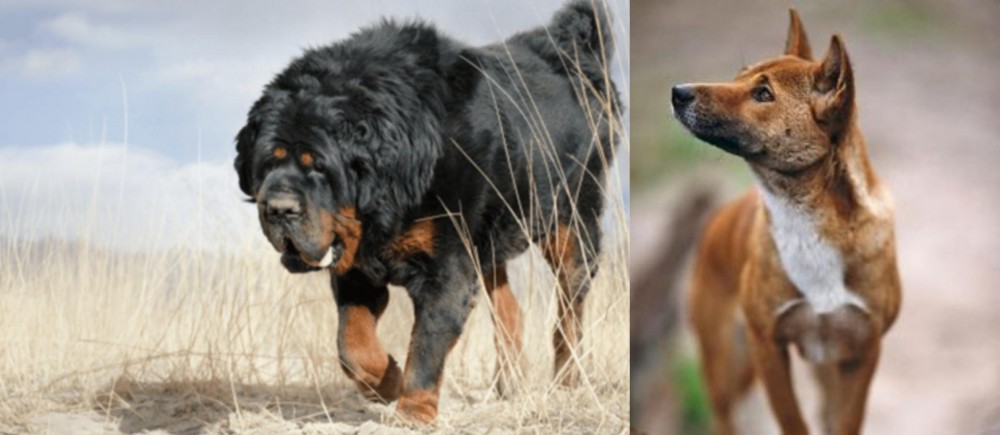 Gaddi Kutta is originated from India but New Guinea Singing Dog is originated from Papua New Guinea. Gaddi Kutta may grow 33 cm / 13 inches higher than New Guinea Singing Dog. Gaddi Kutta may weigh 29 kg / 64 pounds more than New Guinea Singing Dog. Gaddi Kutta may live 5 years less than New Guinea Singing Dog. Gaddi Kutta may have more litter size than New Guinea Singing Dog. Gaddi Kutta requires High Maintenance. But New Guinea Singing Dog requires Moderate Maintenance
Gaddi Kutta is originated from India but New Guinea Singing Dog is originated from Papua New Guinea. Gaddi Kutta may grow 33 cm / 13 inches higher than New Guinea Singing Dog. Gaddi Kutta may weigh 29 kg / 64 pounds more than New Guinea Singing Dog. Gaddi Kutta may live 5 years less than New Guinea Singing Dog. Gaddi Kutta may have more litter size than New Guinea Singing Dog. Gaddi Kutta requires High Maintenance. But New Guinea Singing Dog requires Moderate Maintenance
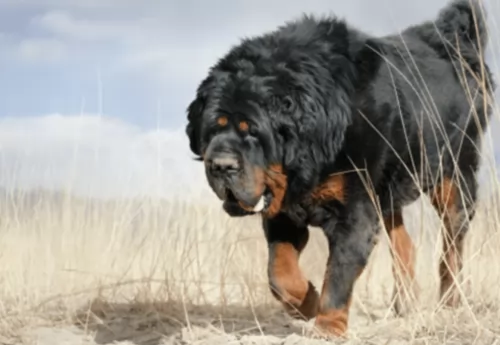 The Gaddi Kutta is mountain dog of the mastiff line from northern India. They are mostly found in the western Himalayas and Himachal Pradesh. It is also seen in Nepal and often named the Indian Panther Hound and the Mahidant Mastiff. They were bred to hunt but because of their strength and intelligence they are used to guard and herd goats and sheep. They are strong enough to defeat or scare off a panther or snow leopard and intelligent enough to work independently in finding strays and bringing them back to their pens. They have been known to protect herds of cattle from bears and leopards.3 or 4 of them working together can handle the guard duties for thousands of cattle.
The Gaddi Kutta is mountain dog of the mastiff line from northern India. They are mostly found in the western Himalayas and Himachal Pradesh. It is also seen in Nepal and often named the Indian Panther Hound and the Mahidant Mastiff. They were bred to hunt but because of their strength and intelligence they are used to guard and herd goats and sheep. They are strong enough to defeat or scare off a panther or snow leopard and intelligent enough to work independently in finding strays and bringing them back to their pens. They have been known to protect herds of cattle from bears and leopards.3 or 4 of them working together can handle the guard duties for thousands of cattle.
Their reputation precedes them – as ferocious and courageous, unmatched in their instincts to protect what is theirs. In the line of the Mastiffs and Molosser, the Gaddi is powerful and agile, and considered to be of ancient heritage though no one is sure what their origin is. The local myth is that dogs were crossed with tigers. It is more likely that dingo-like wild hounds from the Himalaya were crossed with the Tibetan Mastiff to create the Gaddi Kutti. Also found in Pakistan, most lines of the breed have been crossed with others including the German Shepard and the Bully Kutta. Outside of the Himalayas there are not many if any pure lines. The Gaddi Kutta is a good family dog if you socialize him as a puppy. He will be gentle, calm and intuitive with his family, but aggressive toward strangers and other dogs.
 In 1957 the New Guinea Singing Dog was “discovered” in the Highlands of Papua New Guinea and he is found no where else. There is a lot of debate among scientists, taxonomists and biologist as to what is really a species and what is a subspecies. When the NGSD was found he was classified as a new canid species then in 2007 they were downgraded to a subspecies.
In 1957 the New Guinea Singing Dog was “discovered” in the Highlands of Papua New Guinea and he is found no where else. There is a lot of debate among scientists, taxonomists and biologist as to what is really a species and what is a subspecies. When the NGSD was found he was classified as a new canid species then in 2007 they were downgraded to a subspecies.
Today the NGSD is considered to be a wild dog and a primitive dog. They have lived in Papua New Guinea in the Highlands for thousands of years. They are closely related to other wild dogs, such as Australia’s dingo. They are today as they were a thousand years ago – wild. So wild that many counties have them in their zoos.
With the right care and enough socialization, they do very well as companion animals living with people. They are difficult to domesticate however and the person who owns one should be a part of the NGSD community in order to get support, share issues, and learn from others who have lived with these “wild dogs” for many years.
Any New Guinea Singing Dog found in North America or Europe is a direct descendent of two couples that were taken to zoos in China and Australia. The NGSD makes a howling sound that modulates and undulates through a wide series of tones. No other dog makes this musical sound. Rare even in New Guinea today, the Singer is thought to be the rarest of all dogs.
The only organization that recognizes the Singing Dog is the UKC and they are allowed in UKC competition. The NGSD now holds the classification of a domestic dog – a Canis lupus dingo - which is a subspecies of Canis lupus. In 2016 a group of 15 wild dogs were photographed for the first time ever. Prior to this the NGSD were never seen in more than pairs.
It is believed that they do not live and operate in packs, but rather solitary, pairs or family groups where both the parents do the work of raising the pups.
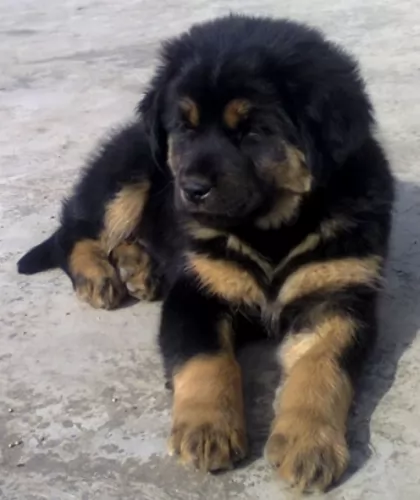 The Gaddi Kutta is a mastiff but he is athletic, has tremendous speed and stamina. He is muscular and deep-chested, leaner than most of the mastiff lines. Their ears can be either natural or cropped, on a very large head. One of the most important traits of the Gaddi Kutta is the massive, arched neck that protects them from predators. He is sturdy with a heavily feathered, thick tail curling over the back.
The Gaddi Kutta is a mastiff but he is athletic, has tremendous speed and stamina. He is muscular and deep-chested, leaner than most of the mastiff lines. Their ears can be either natural or cropped, on a very large head. One of the most important traits of the Gaddi Kutta is the massive, arched neck that protects them from predators. He is sturdy with a heavily feathered, thick tail curling over the back.
They are massive, wolf like dogs, fiery and huge but intelligent and faithful to their people. They are scary even when they are trying to be affectionate. The muzzle is strong, and the mane is thick. The Gaddi has long, heavy legs and very large feet that are feathered, making him even more intimidating.
There are two types of Gaddi Kutti – the longhaired and the shorthaired. The longhaired is the most common and has a fuller coat with long feathering on the tail, legs and chest and some feathering on the feet. They are all usually solid colors of yellow, fawn and cream or they could be piebald, brown or brindle. They have a woolly dense undercoat.
 The New Guinea Singing Dog is a medium sized dog with short legs and a broad head. They are about average height and they are very limber and flexible. They can rotate their paws and spread their legs at much greater angles than the average canine. Thus, they can easily climb a tree. They can jump like a cat.
The New Guinea Singing Dog is a medium sized dog with short legs and a broad head. They are about average height and they are very limber and flexible. They can rotate their paws and spread their legs at much greater angles than the average canine. Thus, they can easily climb a tree. They can jump like a cat.
They have very reflective eyes that are shaped like almonds and have dark rims. The color of the eye can be dark brown to dark amber. It is also believed that they can see better than other domestic dogs in low light settings. Their pupils let in more light due to pupils that are wider than most other dogs.
The ears of the NGSD are lined with fur, pointed and erect. The are forward laying and can be rotated in order to hear even the farthest and faintest of sounds. There are dark guard hairs on the spine and back of the ears and tail. On young dogs the muzzle is black but by age 7 it is already beginning to turn gray.
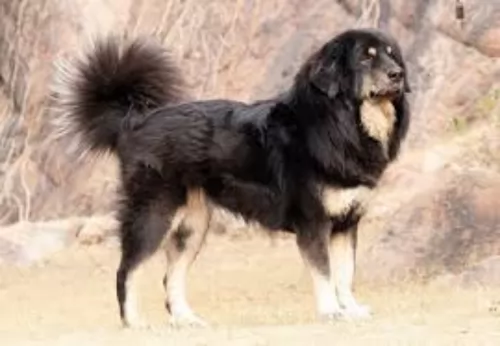 They are not always great with children, but they will protect own children in their family. Do not leave unattended.
They are not always great with children, but they will protect own children in their family. Do not leave unattended.
They have the ability to bring down a wolf or even a bear or snow leopard.
Because of his size, temperament and coat he is not very adaptable. He is good outside in a colder region and with a lot of land to roam, but not in a hot region or in an apartment.
This breed is very smart, learns quickly on his own.
 They could be, but it must be remembered that this is a wild dog.
They could be, but it must be remembered that this is a wild dog.
Varying the pitches when howling
It’s possible but not recommended. Leave them wild.
Highly intelligent but trainability is questionable unless well socialize and attached to their people.
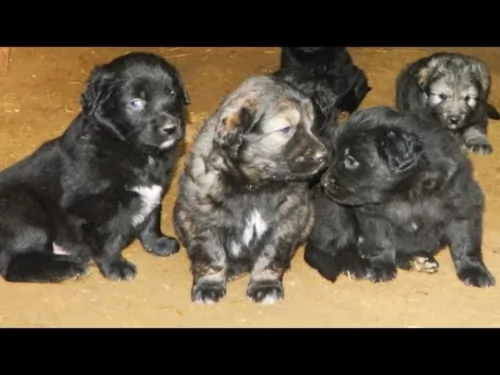 The breed is prone to obesity if they do not get enough exercise or a decent diet.
The breed is prone to obesity if they do not get enough exercise or a decent diet.
 Though the breed is not extinct – it is so wild and secretive that there is no history or record of any health problems. However, the small number of domestic companion animals have shown health issues in recent years.
Though the breed is not extinct – it is so wild and secretive that there is no history or record of any health problems. However, the small number of domestic companion animals have shown health issues in recent years.
Pancreatitis – can be chronic or acute. If chronic it needs to be treated and diet changed. If acute it is usually deadly.
Hip Dysplasia – can cause lameness or arthritis.
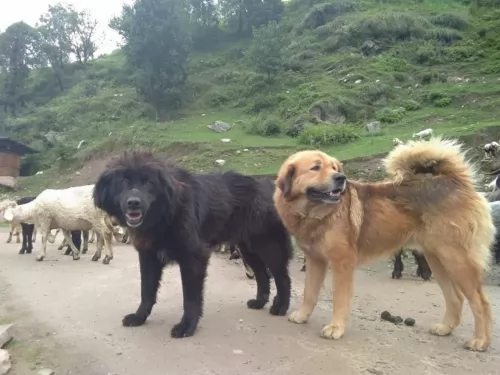 Should feed a high quality dry puppy food for large dogs. Give 1-2 cups per day split into 2-3 meals.
Should feed a high quality dry puppy food for large dogs. Give 1-2 cups per day split into 2-3 meals.
Again you want to feed high quality dry adult dog food for large dogs. Give 3-4 cups per day split into 2 meals. Watch for obesity and if your Gaddi Kutta is gaining too much weight, cut back.
The Gaddi Kutti seems to be immune to the most common of canine diseases.
This is a breed of very large dogs that need daily exercise by walking and running. However, since they have been fairly isolated in India and the Himalayas, he has not been exposed to organized dog play and exercise such as agility, dock jumping or field trials. He would probably succeed at all three.
 In the wild both pups and adults are thought to eat small mammals and birds as well as fruits. In homes feed a high protein diet. Because of the tendency toward pancreatitis do not feed raw or under cooked meat. If feeding meet do so in small amounts well cooked, very lean. Stay away from the fat. Feed puppies very small amounts. ¾-1 cup high quality dry puppy food twice a day.
In the wild both pups and adults are thought to eat small mammals and birds as well as fruits. In homes feed a high protein diet. Because of the tendency toward pancreatitis do not feed raw or under cooked meat. If feeding meet do so in small amounts well cooked, very lean. Stay away from the fat. Feed puppies very small amounts. ¾-1 cup high quality dry puppy food twice a day.
Same as the puppy when it comes to meat although you could give the adult a little more. 1 ½ cups od high quality medium breed dog food twice a day.
In the wild there is no indication of health issue. A very healthy breed.
The NGSD needs a lot of stimulation both mental and physical. They must have a daily walk and somewhere to run. They are escape artist in homes. Remember they can jump like cats and climb trees. If their head can pass through a hole, so can the rest of their body.